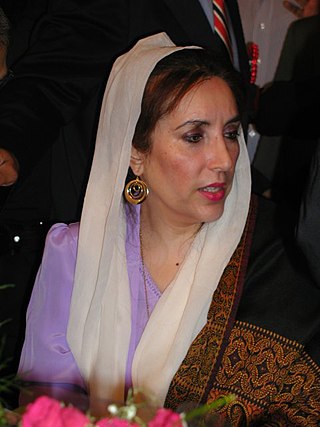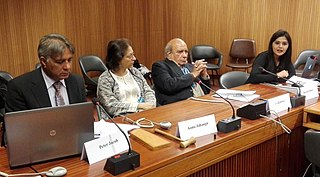
Sexual harassment is a type of harassment involving the use of explicit or implicit sexual overtones, including the unwelcome and inappropriate promises of rewards in exchange for sexual favors. Sexual harassment can be physical and/or a demand or request for sexual favors, making sexually colored remarks, showing pornography, and any other unwelcome physical, verbal, or non-verbal conduct of a sexual nature. Sexual harassment includes a range of actions from verbal transgressions to sexual abuse or assault. Harassment can occur in many different social settings such as the workplace, the home, school, or religious institutions. Harassers or victims can be of any gender.

Women in Pakistan make up 48.76% of the population according to the 2017 census of Pakistan. Women in Pakistan have played an important role in Pakistani history and have had the right to vote since 1956. In Pakistan, women have held high office including Prime Minister, Speaker of the National Assembly, Leader of the Opposition, as well as federal ministers, judges, and serving commissioned posts in the armed forces, with Lieutenant General Nigar Johar attaining the highest military post for a woman. Benazir Bhutto was sworn in as the first woman Prime Minister of Pakistan on 2 December 1988.

The Protection of Women from Domestic Violence Act 2005 is an Act of the Parliament of India enacted to protect women from domestic violence. The law came into force on 26 October 2006. For the first time in Indian law, the Act defines "domestic violence", with the definition being broad and including not only physical violence, but also other forms of violence such as emotional, verbal, sexual and psychological abuse. It is a civil law meant primarily for protection orders, rather than criminal enforcement.

Wayne Pacelle is an American animal rights and animal welfare activist, non-profit businessperson and author. Two of his books have been New York Times best-sellers.

National Commission on Status of Women (NCSW) is a Pakistani statutory body established by the President Pervez Musharraf, under the XXVI Ordinance dated 17 July 2000. It is an outcome of the national and international commitments of the Government of Pakistan like Beijing Declaration and Platform for Action, 1995; and 1998 National Plan of Action (NPA) for Women, 1998.
Equal Rights Advocates (ERA) is an American non-profit gender justice/women's rights organization that was founded in 1974. ERA is a legal and advocacy organization for advancing rights and opportunities for women, girls, and people of marginalized gender identities through legal cases and policy advocacy.
Harassment covers a wide range of behaviors of offensive nature. It is commonly understood as behavior that demeans, humiliates, and intimidates a person, and it is characteristically identified by its unlikelihood in terms of social and moral reasonableness. In the legal sense, these are behaviors that appear to be disturbing, upsetting or threatening. Traditional forms evolve from discriminatory grounds, and have an effect of nullifying a person's rights or impairing a person from benefiting from their rights. When these behaviors become repetitive, it is defined as bullying. The continuity or repetitiveness and the aspect of distressing, alarming or threatening may distinguish it from insult.

Women in Malaysia receive support from the Malaysian government concerning their rights to advance, to make decisions, to health, education and social welfare, and to the removal of legal obstacles. The Malaysian government has ensured these factors through the establishment of Ministry of National Unity and Social Development in 1997. This was followed by the formation of the Women's Affairs Ministry in 2001 to recognise the roles and contributions of Malaysian women.

The Sexual Harassment of Women at Workplace Act, 2013 is a legislative act in India that seeks to protect women from sexual harassment at their place of work. It was passed by the Lok Sabha on 3 September 2012. It was passed by the Rajya Sabha on 26 February 2013. The Bill got the assent of the President on 23 April 2013. The Act came into force from 9 December 2013. This statute superseded the Vishaka Guidelines for Prevention Of Sexual Harassment (POSH) introduced by the Supreme Court (SC) of India. It was reported by the International Labour Organization that very few Indian employers were compliant to this statute. Most Indian employers have not implemented the law despite the legal requirement that any workplace with more than 10 employees need to implement it. According to a FICCI-EY November 2015 report, 36% of Indian companies and 25% among MNCs are not compliant with the Sexual Harassment Act, 2013. The government has threatened to take stern action against employers who fail to comply with this law.

Vishaka and Ors. v. State of Rajasthan was a 1997 Indian Supreme Court case where various women's groups led by Naina Kapur and her organisation, Sakshi filed Public Interest Litigation (PIL) against the state of Rajasthan and the central Government of India to enforce the fundamental rights of working women under Articles 14, 19 and 21 of the Constitution of India. The petition was filed after Bhanwari Devi, a social worker in Rajasthan, was brutally gang raped for stopping a child marriage.
Violence against women in Pakistan, particularly intimate partner violence and sexual violence, is a major public health problem and a violation of women's human rights in Pakistan. Women in Pakistan mainly encounter violence by being forced into marriage, through workplace sexual harassment, domestic violence and by honour killings.
The law for workplace bullying is given below for each country in detail. Further European countries with concrete antibullying legislation are Belgium, France, and The Netherlands.
Founded in 2001, Alliance Against Sexual Harassment (AASHA) is an alliance of non-government organizations (NGOs) including Action Aid Pakistan, Bedari, Working Women's Support Centre, Working Women Association, Federal Women's Welfare Agency, Conscience Promoters, Pakistan Institute of Labour Education & Research, and Working Women Organisation. AASHA is a non-governmental organization operating in Lahore and Karachi which raises awareness regarding sexual harassment and lobbies the policymakers to take action against it.
Fauzia Viqar is a Pakistani human rights activist with a focus on women's rights. She served as the first chairperson of the Punjab Commission on the Status of Women from 2014 to 2019.
In Malaysia, sexual harassment, as defined by the Employment Act 1955Archived 11 November 2020 at the Wayback Machine, is “any unwanted conduct of a sexual nature, whether verbal, non-verbal, visual, gestural or physical, directed at a person which is offensive, humiliating or a threat to their well-being”. The Act does not distinguish between male and female or employer and employee. As such, sexual harassment can be committed by a female against a male, or an employee against an employer.

Reema Omer is a Pakistani lawyer, human rights professional and news analyst. She is currently working as a legal adviser for the International Commission of Jurists. She is a visiting faculty member at Lahore School of Law. She regularly writes her opinion on the legal landscape and human rights issues in Pakistan, and contributes her legal and political analysis in current affairs shows on different news channels.
The Punjab Commission on Status of Women (PCSW) is a human rights institution in Pakistan, which was established by the Government of Punjab in March 2014 under the PCSW Act, 2014. Its mandate is to work for the empowerment of women, expansion of opportunities for socio-economic development of women, and elimination of all forms of discrimination against women.
The legislative assembly of Pakistan has enacted several measures designed to give women more power in the areas of family, inheritance, revenue, civil, and criminal laws. These measures are an attempt to safeguard women's rights to freedom of speech and expression without gender discrimination. These measures are enacted keeping in mind the principles described by the Quran.
National Women's Day in Pakistan is 12 February of each year, chosen to mark the first women's march in Pakistan against the Zia ul Haq's military regime. The date 12 February 1983 is significant in the history of women's rights in Pakistan because the first such march was brutally suppressed by the martial law enforced by the police of General Zia ul Haq's regime. The Day is over three weeks before International Women's Day when the Aurat Marches take place in Pakistan.

Federal Ombudsman Secretariat for Protection Against Harassment or Federal Ombudsman Secretariat for Protection Against Harassment At Workplace (FOSPAH) is an autonomous Quasi-judicial body working under the Act No-IV of 2010 and The Enforcement of Women's Property Rights Act, 2020, for the protection against harassment at the workplace, and also has jurisdiction of hearing the cases related to inheritance of women in the Pakistan. Kashmala Tariq is current Federal Ombudsman for Protection Against Harassment. It was established in 2010.








